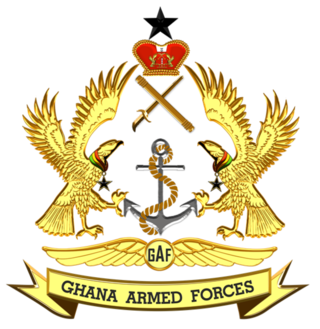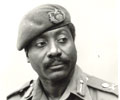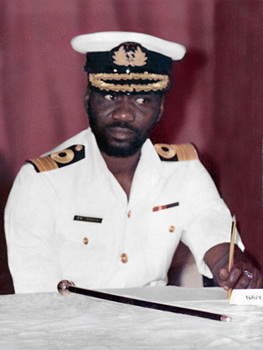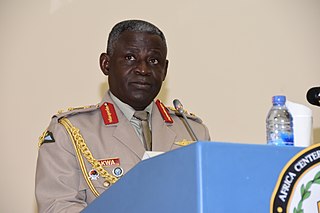Related Research Articles

The Ghana Armed Forces (GAF) is the unified armed force of Ghana, consisting of the Army (GA), Navy (GN), and Ghana Air Force.

Politics of Ghana takes place in a framework of a presidential representative democratic republic, whereby the president of Ghana is both head of state and head of government, and of a two party system. The seat of government is at Golden Jubilee House. Executive power is exercised by the government. Legislative power is vested in both the government and Parliament. The judiciary is independent of the executive and the legislature.

A commander in chief or supreme commander is the person who exercises supreme command and control over an armed force or a military branch. As a technical term, it refers to military competencies that reside in a country's executive leadership, a head of state, head of government, or other designated government official.

Lieutenant General Frederick William "Fred" Kwasi Akuffo was a Ghanaian soldier and politician. He was Chief of the Defence Staff of the Ghana Armed Forces from 1976 to 1978, and chairman of the ruling Supreme Military Council in Ghana from 1978 to 1979. He became leader of the government in a palace coup against General Kutu Acheampong, and was overthrown and executed in another military coup less than a year later.

Mehmet İlker Başbuğ is a Turkish former general who served as the 26th Chief of the General Staff of Turkey. He was charged with contravention of Articles 309, 310, and 311 of the Turkish Penal Code. In August 2013, he was convicted on charges of "establishing and leading a terrorist organization" and "attempting to destroy the Turkish government or attempting to partially or completely prevent its functioning" and sentenced to life imprisonment as part of the Ergenekon trials. However, the Constitutional Court of Turkey determined that Başbuğ's legal rights were violated and overturned his conviction; he was released on 7 March 2014.

The Ministry of Defence is charged with co-ordinating and supervising all agencies and functions of the government relating directly to national security and the Somali Armed Forces. The President of Somalia is the Supreme Commander of the Armed Forces of the country. The Ministry of Defence provides policy framework and resources to the Armed Forces to discharge their responsibility in the context of the defence of the country. The Armed Forces under the Defence Ministry are primarily responsible for ensuring the territorial integrity of the nation. The current Minister of Defence of Somalia is Abdulkadir Mohamed Nur.

The National Redemption Council (NRC) was the ruling Ghana military government from 13 January 1972 to 9 October 1975. Its chairman was Colonel I. K. Acheampong, who was thus also the head of state of Ghana.

The Supreme Military Council (SMC) was the ruling government of Ghana from 9 October 1975 to 4 June 1979. Its chairman was Colonel I.K. Acheampong. He was also the Head of state of Ghana due to his chairmanship.
Lieutenant General Albert Kwesi Ocran was a soldier and politician. He was a member of the Presidential Commission of Ghana between 1969 and 1970. He is a former Chief of the Defence Staff of the Ghana Armed Forces and was a member of the National Liberation Council (NLC) military government in Ghana.

Brigadier Joseph Nunoo-Mensah is a Ghanaian soldier and politician. He is a former Chief of Defence Staff of the Ghana Armed Forces. He was also a member of the Provisional National Defence Council government which overthrew the government of Dr. Hilla Limann in 1981.
Major General Robert Ebenezer Abossey Kotei was a soldier, politician and track and field athlete. He was once the Chief of Defence Staff of the Ghana Armed Forces and also a member of the Supreme Military Council that ruled Ghana between 1975 and 1979. He was executed in 1979, following a military coup. He also held the Ghanaian high jump record for many years.

The Chief of the Defence Staff (CDS) is the professional head of the Ghana Armed Forces. He is thus responsible for the administration and the operational control and command of the Ghana military. The CDS is a member of the Armed Forces Council. This council advice the President of Ghana on matters of policy relating to defence and also regulates the administration of the Armed Forces. It also advises the President on the promotion of all officers above the rank of Lieutenant-Colonel or its equivalent.
Napoleon Yaovi Richard Ashley-Lassen was a Chief of the Defence Staff of the Ghana Armed Forces. He was also twice Chief of Air Staff of the Ghana Air Force. He was also a member of the National Redemption Council (NRC), formed after the overthrow of the Busia government in 1972.

Rear Admiral Chemogoh Kevin Dzang was born at Nandom in the Upper West Region of Ghana. He was a naval officer and a former Chief of Naval Staff of the Ghana Navy. He also served Ghana as a Secretary of State for Defence and an ambassador to Japan with concurrent accreditation to the Commonwealth of Australia, Papua New Guinea, Singapore, South Korea, Malaysia, New Zealand, Indonesia, the Philippines, Brunei Darussalam and Thailand.
Lieutenant General Lawrence Aboagye Okai was a Ghanaian army officer. He was the Chief of the Defence Staff of the Ghana Armed Forces. He also served on the Supreme Military Council (SMC) of the government led by General Acheampong.

The National Defence College, located in New Delhi, is the defence service training institute and highest seat of strategic learning for officers of the Defence Service and the Civil Services. This is a very prestigious course attended only by a few hand-picked defence officers of One-Star rank and civil servants of the rank of Joint secretary to the Government of India. Each year, approximately 25 officers from friendly foreign countries like the US, UK, Canada, France, Germany, Australia, Vietnam, Sri Lanka, Nepal, UAE and others attend the course.
Major General Neville Alexander Odartey-Wellington (1934–1979) was a Ghanaian army officer who was Chief of Army Staff of the Ghana Army from 1978 to 1979. He died in action leading loyal troops against revolting forces during the 4 June 1979 military uprising in Ghana which toppled the Supreme Military Council II government led by Fred Akuffo.
Lieutenant General Arnold Quainoo is a Ghanaian former military officer and served as the Chief of Defence Staff of the Ghana Armed Forces from August 1983 to September 1989. He took over from Flight Lieutenant J. J. Rawlings and handed over to Lieutenant General Winston Mensa-Wood. He was also the first commander of the Economic Community of West African States Monitoring Group (ECOMOG) which intervened in Liberia to help end the civil war. He also served twice as Army Commander, first in 1979 following the coup-d'état by the Armed Forces Revolutionary Council which overthrew the Supreme Military Council. He was replaced when the Limann government was elected. He was however re-appointed as Chief of Army Staff following the coup by the Provisional National Defence Council and later as General Officer Commanding the Ghana Armed Forces.

Lieutenant General Obed Boamah Akwa is a retired Ghanaian military officer who served as the Chief of the Defence Staff of the Ghana Armed Forces from February 2017 to February 2021. Prior to his appointment, he was the Chief of Army Staff of the Ghana Armed Forces.

General Mya Tun Oo is a Burmese military officer and politician who serves as the incumbent Deputy Prime Minister of Myanmar since 2023 February and Minister for Defence and member of the State Administration Council since 2021 February. He is also a member of the National Defence and Security Council as the Minister of Defence.
References
- 1 2 "ADDO v STATE HOUSES ALLOCATION POLICY IMPLEMENTATION COMMISSION (SHAPIC) AND TEMA DEVELOPMENT CORPORATION (TDC)" (PDF). Landmark Cases (combined). Accra, Ghana: Commission on Human Rights and Administrative Justice of Ghana. 16 December 1994. pp. 13–17. Archived from the original (pdf) on 5 October 2011. Retrieved 5 November 2008.
- ↑ "Past Army Commanders / Chiefs of Army Staff". Official website. Ghana Armed Forces. 6 February 2008. Archived from the original on 16 October 2008. Retrieved 5 November 2008.
- ↑ "Past General Officers Commanding /chiefs of the Defence Staff". Official website. Ghana Armed Forces. 6 February 2008. Archived from the original on 16 October 2008. Retrieved 5 November 2008.
- ↑ "Former Heads of MoFA". Official website. Ministry of Food and Agriculture. Retrieved 7 August 2012.